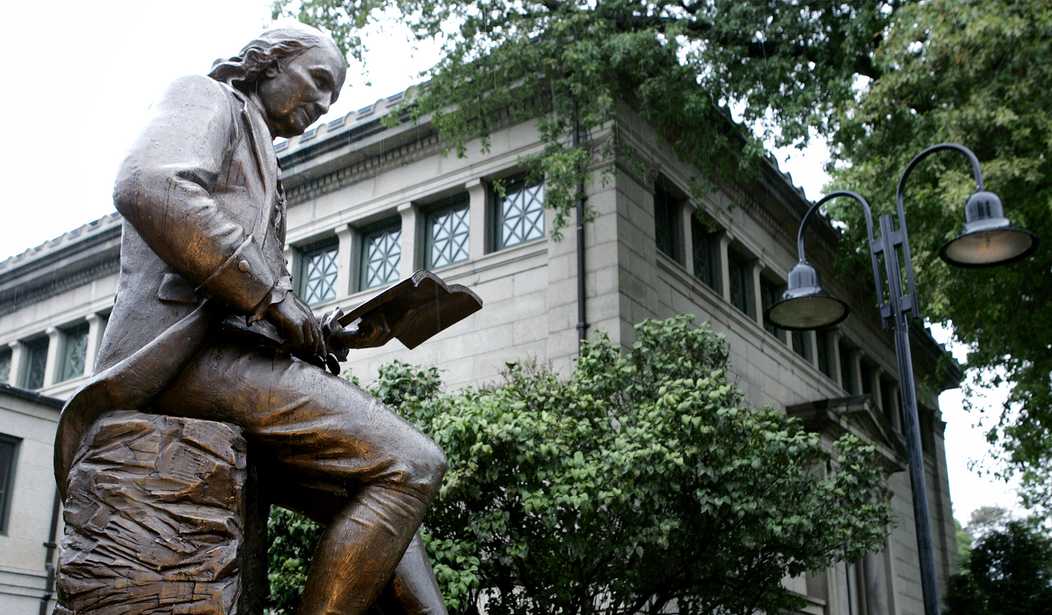Benjamin Franklin brilliantly observed, “Those who would give up essential Liberty, to purchase a little temporary Safety, deserve neither Liberty nor Safety.” If the Covid lockdowns taught us anything, it’s that many Americans now value safety over liberty—and that this can be horribly destructive.
The American Revolution was fought because our forefathers believed that rights were more important than safety and comfort. From that time up through WWII, the love of rights and freedom over safety was strong in America. There were those who wrongly demanded their “rights” at the expense of others, of course, such as the slave owners. However, the idea that safety was not the most important thing was a defining characteristic of the American ethos. Since World War II, however, that has changed.
During Covid, I saw clearly for the first time how much Americans were willing to sacrifice of their rights and freedoms for safety—either safety from Covid, or safety from government ire. And what occurred? It was devastating. Thousands of businesses closed, children were seriously developmentally delayed, suicides spiked, churches closed, people became isolated and divided, the economy cratered, and the vaccines injured an unknown number of people. The choice for “safety” was not so safe after all.
Franklin noted that those who prioritize safety deserve neither liberty or safety, but he might well have noted also that those who prioritize safety will receive neither liberty nor safety. Now we find that the government is weaponized against us, censoring and arresting and prosecuting and persecuting Americans not based on their guilt, but based on political bias. We came to this point because we were willing to sacrifice liberty for safety or convenience. If we don’t want to turn into an oligarchy, we had better develop the moral courage to say “no” to government sooner rather than later.
There are two passages in G.K. Chesterton’s “The Ballad of the White Horse” that seem applicable here. In it, the Anglo-Saxons, dismayed by the battlefield deaths of their noble leaders, are fleeing from the powerful, pagan Danish army. King Alfred halts the soldiers and asks them if it is better to go back and face death courageously, or to survive only to submit to tyrannical rule.
To sweat a slave to a race of slaves,/ To drink up infamy? /No, brothers, by your leave, I think/ Death is a better ale to drink, /And by all the stars of Christ that sink, /The Danes shall drink with me…
The men that tear the furrows, /The men that fell the trees, /When all their lords be lost and dead /The bondsmen of the earth shall tread /The tyrants of the seas.
The nobles have fallen and died and failed, but the peasants follow Alfred back, and, after the appearance of a heavenly vision of Jesus’s Mother Mary, the Saxons miraculously win the battle. The Danes look up, stunned, as “the people of the peace of God /Went roaring down to die.” Until they were unafraid, until they were not only willing but expecting to lose everything, the Saxons did not win. It’s a lesson we could learn too.
And again, in the last section of the “Ballad,” Alfred has grown old, but the pagans have returned and he must take up his sword and fight again. While reflecting on the fact that the fight against evil is never-ending, one which has no final victory in this life, Alfred has a “vision” of what the barbarian seeking to destroy society will be like in a future age. In fact, Chesterton puts a critique of modern would-be tyrants and Marxists into the mouth of Alfred here:
They shall come mild as monkish clerks, /With many a scroll and pen; /And backward shall ye turn and gaze, /Desiring one of Alfred’s days, /When pagans still were men…
By this sign you shall know them [the new barbarians],/ The breaking of the sword, /And man no more a free knight, /That loves or hates his lord…
What though they come with scroll and pen, /And grave as a shaven clerk, /By this sign you shall know them, /That they ruin and make dark.
Alfred’s, or rather Chesterton’s, warning of “one blind idiot world obeyed” and “God and man dishonored” seems a little too uncomfortably relevant to Joe Biden’s America and the current culture wars. But, like Alfred, we must go to face the foe unafraid, even though we fight in schools and workplaces and voting places instead of on battlefields with physical weapons. “Know ye the old barbarian, /The barbarian come again.”
The tyrants can only win if we obey them. If all freedom-lovers in America said “no,” then the Marxist totalitarians could not enforce their will. That is why they try to make us afraid, so that we will obey them even when it is self-destructive to do so.
If Covid lockdown policies are reinstated, or you are censored online, or you face the choice between your job and standing for what is right, or you even face jail as the Jan. 6 prisoners and some pro-life activists do, ask yourself one question: Is it really better to stay silent and be a slave, forever ruled by fear, or is it better to stand for justice and liberty—as the Founding Fathers did? Or, put another way, for what shall it profit a man, if he shall gain safety, and lose his liberty and his soul?










